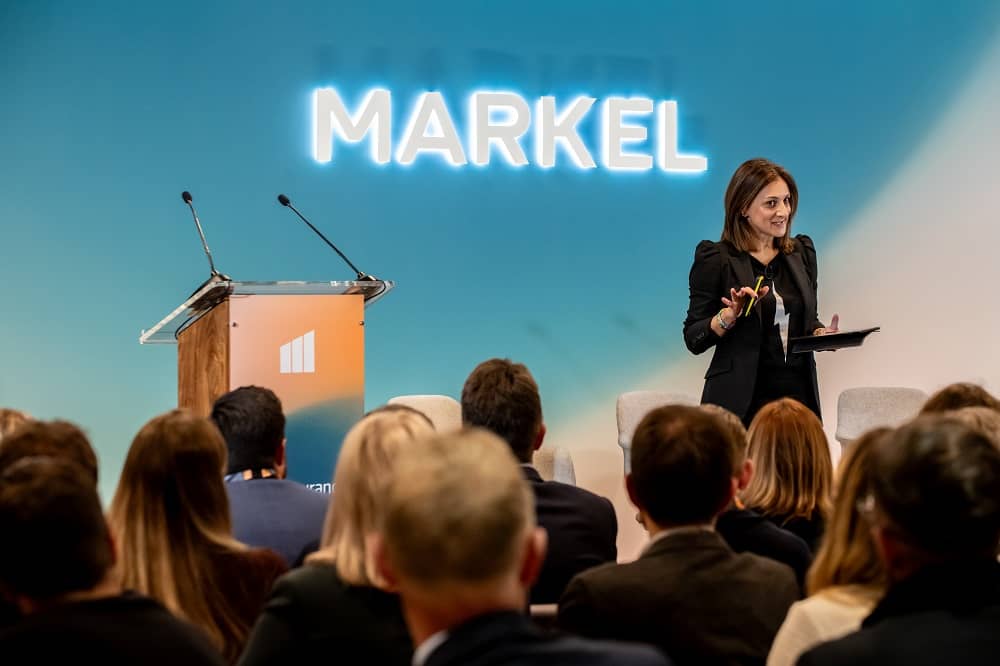With more than 50,000* firms starting up, the UK’s tech sector is thriving.
The UK’s tech sector is booming, with 51,017 companies starting up in the sector in 2023, an increase of 22% from the year before, according to analysis by RSM UK. At the 2024 MarkelTech launch event, journalist and presenter Sasha Qadri suggests the UK is currently operating at “peak-tech”, benefiting from significant venture capital investment and a strong record in bringing ideas to market. The tech market is even spreading into space, with implications for how organisations operate and manufacturing supply chains.
Watch highlights of the MarkelTech launch event, which explored the UK tech landscape and the opportunity for brokers.
Sector challenges
Yet there are challenges for the sector, too. Cyber-attacks are a significant risk, with half of businesses reporting they have experienced an attack in the last 12 months. “There’s not a day that goes by when we don’t hear about an attack, so there is definitely concern from businesses,” says Jo Sykes, divisional director broker at Markel.
Another issue is the uncertain geopolitical climate in which all businesses operate, including the prospect of wars erupting. “Global supply chains can be disrupted, and third-party software providers are especially susceptible to that,” says Sam Rix, technology and cyber underwriting manager at Markel.
Global supply chains can be disrupted, and third-party software providers are especially susceptible to that.
Then there are the other issues that can affect any organisation, but small and medium-sized enterprises in particular. These include cash flow issues, debt recovery and the need for support around tax and legal issues.
Having the right insurance partner is vital to navigating such challenges, and MarkelTech has been built based on insights from brokers and tech businesses themselves.
All round support
As well as comprehensive insurance offerings, Markel provides support services that are designed to help businesses thrive, as well as reduce their risk. “It goes beyond the insurance contract,” says Sykes. “One of the services we offer is a debt recovery service, which is facilitated by our tax team. We had a digital marketing agency which was struggling with a particularly difficult client, and were able to recover a £35,000 debt for them.”
Rix gives an example of a business that received assistance from the tax helpline to apply for government support. “Technology companies are entitled to grants from the government if they go through a certain, very stringent process,” he says. “Our experts can help them from start to finish, and the average payout on that is £50,000. These are tangible benefits that are unique in the market.”
This is a carousel with auto-rotating slides. Activate the pause button to disable rotation.
Over 100 UK brokers were in attendance at the MarkelTech launch event to hear keynote speakers
reflecting on the UK tech landscape.
From a cybersecurity perspective, Markel’s eRiskHub allows firms to assess their cyber-resilience and develop a strategy to help them respond to, and recover from, any incident. “You can download ransomware stress tests to assess the impact that would have, and undertake phishing training, which is one of the biggest causes of a cyber claim,” says Rix.
Other additional services include a business hub complete with templates; employment law advice; support around IR35; PR crisis management and a contract review service, designed to provide support for businesses as they grow.
* Tech Nation Report 2023/24
Learn more about technology insurance
Related articles
-

Professor Brian Cox: Hitting the final frontier
The UK’s space sector is set for rapid growth, and will soon be part of our wider technology ecosystem, predicts Professor Brian Cox. But there are risks associated with it too.
-

Countering the cyber threat
The rise of cyber-attacks means businesses of all sizes are at risk. Having specialist insurance can help ensure they recover quickly should they be affected.
-

UK hits ‘peak-tech’
The UK is a mature technology landscape and offers an attractive location for start-ups, says technology journalist Sasha Qadri. But more needs to be done to encourage firms to scale up.


